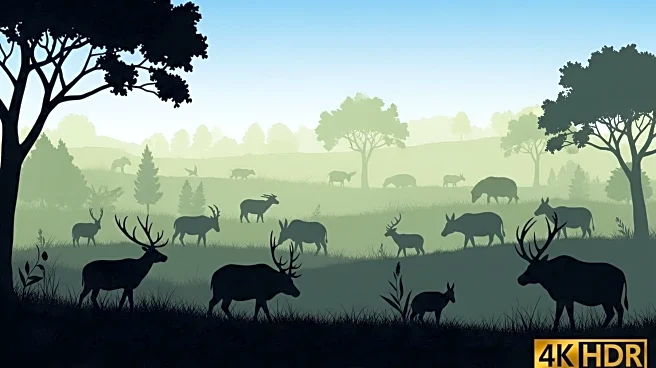What's Happening?
A recent study has highlighted the profound impact of agriculture and livestock farming on mammal communities over the past 10,000 years. The research, led by Barry Brook at the University of Tasmania, traces 50,000 years of animal history, showing a pivot point after the Late Pleistocene. During this period, mammal communities were shaped by climate zones and geographic barriers. However, the rise of agriculture led to the spread of domesticated species, collapsing these biogeographic boundaries. The study found that domesticated mammals, such as cattle, sheep, goats, pigs, and horses, replaced many wild species, leading to hunting-driven extinctions. This shift has resulted in ecosystems that are no longer bound by climate or geography alone, with domesticated mammals acting as a unifying force across distant regions.
Why It's Important?
The findings underscore the long-term impact of human activity on natural ecosystems, complicating current conservation efforts. As domesticated species replaced native fauna, many regions lost their unique mammal communities, affecting biodiversity. This historical context is crucial for modern conservation strategies, as it highlights the need to consider human-induced changes when protecting 'natural' communities. In regions like Australia and the Americas, national parks now lack many large native mammals that would have persisted without human interference. Understanding these dynamics can guide rewilding efforts and help identify native species that can be restored, offering a clearer baseline for conservation.
What's Next?
The study suggests that conservation efforts must account for the historical reshaping of ecosystems by human activity. This includes managing livestock near protected areas and identifying native species for restoration. The research introduces 'chase clustering,' a method that groups locations by species similarity, ignoring geographic distance, which can be applied to other fossil datasets to detect human impacts. This approach can help disentangle hunting impacts from climate changes and domestication effects from cultural shifts, providing a more nuanced understanding of ecosystem changes over time.
Beyond the Headlines
The study challenges the notion of 'natural' ecosystems, revealing that many have been fundamentally reorganized for millennia. This insight is crucial for rewilding and conservation efforts, as it provides clarity about baselines and the extent of human influence. The research also offers a fresh tool for detecting human fingerprints across time and space, aiding in the development of more effective conservation strategies.










